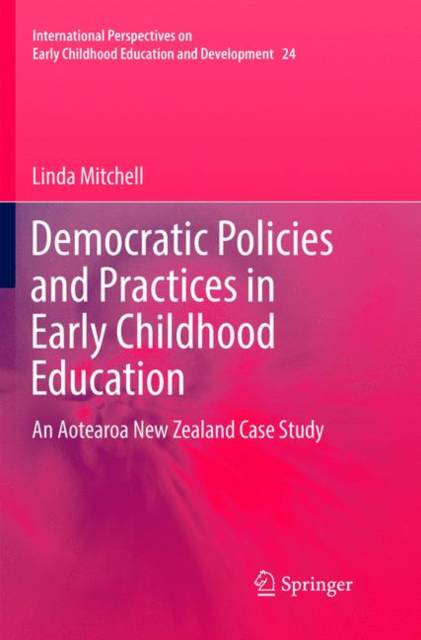
- Retrait gratuit dans votre magasin Club
- 7.000.000 titres dans notre catalogue
- Payer en toute sécurité
- Toujours un magasin près de chez vous
- Retrait gratuit dans votre magasin Club
- 7.000.0000 titres dans notre catalogue
- Payer en toute sécurité
- Toujours un magasin près de chez vous
Democratic Policies and Practices in Early Childhood Education
An Aotearoa New Zealand Case Study
Linda MitchellDescription
This book uses case studies of Aotearoa New Zealand policy formulation and practice to explore early childhood education and care (ECEC) as a site for democratic citizenship and social justice. Addressing fundamental questions about the purpose of education, it argues for explicit values focusing on children and childhood as a basis for ECEC policy to replace discourses of economic investment and child vulnerability that are dominant within policy goals in many countries. A commitment to democracy and equity is a good place to start. Aotearoa New Zealand is of special interest because of its world-renowned ECE curriculum, Te Whāriki, which is based on principles of social justice, respect for rights and an aim to support children growing up in a democracy. The curriculum upholds Māori rights to tino rangatiratanga (absolute authority over their lives and resources). Yet, Aotearoa New Zealand's extreme market policies and harsh labour laws during recent periods run contrary to idealsof democracy and are puzzlingly inconsistent with curriculum principles.
The book starts with an analysis and critique of global trends in ECEC in countries that share capitalist mixed economies of welfare, and where competition and marketisation have become dominant principles. It then analyses ideas about children, childhood and ECEC within a framework of democracy, going back to the Athenean origins of democracy and including recent literature on meanings and traditions of democracy in education. The book uses vivid examples from researching curriculum, pedagogy and assessment practices within Aotearoa New Zealand ECEC settings and collective action to influence policy change in order to illustrate opportunities for democratic education. It concludes by examining what conditions might be needed for integrated and democratic ECEC provision in Aotearoa New Zealand, and what changes are necessary for the future. It offers a compass not a map; it points to promising directions and provides insights into issues in ECEC policy and practice that are of current global concern.
Spécifications
Parties prenantes
- Auteur(s) :
- Editeur:
Contenu
- Nombre de pages :
- 176
- Langue:
- Anglais
- Collection :
- Tome:
- n° 24
Caractéristiques
- EAN:
- 9789811346866
- Date de parution :
- 02-02-19
- Format:
- Livre broché
- Format numérique:
- Trade paperback (VS)
- Dimensions :
- 156 mm x 234 mm
- Poids :
- 272 g

Les avis
Nous publions uniquement les avis qui respectent les conditions requises. Consultez nos conditions pour les avis.






